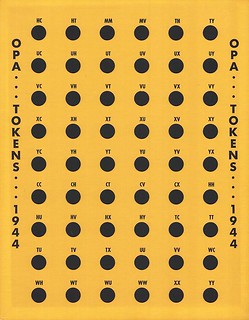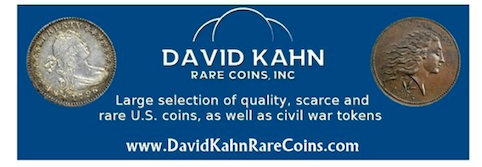
COIN BOARDS: RATION TOKENS, GHOSTLY TONING
In the Spring 2021 issue of Coin Board News, Dave Lange notes recent research assistance from E-Sylum readers and gives us a nice shout-out. Another item shows some unusual ghostly toning on a coin once stored in a Whitman folder. With permission, we're republishing both items here. Thanks.
-Editor
 YET ANOTHER FOLLOW-UP In CBN #44 I ran a short piece
about the coin boards produced circa 1970 to hold tokens issued during
World War II by the Office of Price Administration (OPA). I noted that
the creator of the boards was Joseph A. Lawonde, but I knew very little
about him. My story was reproduced in The E-Sylum, a wonderful
online publication that comes out weekly and features news and
reviews of numismatic literature and research. Another reader of The E-Sylum sent me an old flyer put out by the Society of Ration Token
Collectors around the same time as the boards. In it, Joe Lawonde was
revealed as the editor of The Ration Board, the society's quarterly
bulletin, and his address was given as 135 Duer Street in North
Plainfield, New Jersey. The boards were offered for sale at $3 to
members and $4 to non-members, with orders going to A. G. Kressly in
East Stroudsburg, Pennsylvania. The SRTC is still active today, and its
website is linked through the Token and Medal Society:
http://www.tokenandmedal.org/. By the way, The E-Sylum is sent
online for free, and it's my favorite read each week. Write Editor
Wayne Homren at whomren@gmail.com to sign up. Drop my name,
and he may extend my free subscription!
YET ANOTHER FOLLOW-UP In CBN #44 I ran a short piece
about the coin boards produced circa 1970 to hold tokens issued during
World War II by the Office of Price Administration (OPA). I noted that
the creator of the boards was Joseph A. Lawonde, but I knew very little
about him. My story was reproduced in The E-Sylum, a wonderful
online publication that comes out weekly and features news and
reviews of numismatic literature and research. Another reader of The E-Sylum sent me an old flyer put out by the Society of Ration Token
Collectors around the same time as the boards. In it, Joe Lawonde was
revealed as the editor of The Ration Board, the society's quarterly
bulletin, and his address was given as 135 Duer Street in North
Plainfield, New Jersey. The boards were offered for sale at $3 to
members and $4 to non-members, with orders going to A. G. Kressly in
East Stroudsburg, Pennsylvania. The SRTC is still active today, and its
website is linked through the Token and Medal Society:
http://www.tokenandmedal.org/. By the way, The E-Sylum is sent
online for free, and it's my favorite read each week. Write Editor
Wayne Homren at whomren@gmail.com to sign up. Drop my name,
and he may extend my free subscription!
 NATURAL PHENOMENA DEPARTMENT With
this issue featuring an item about my article on Whitman
folders in The Numismatist, this seems like a good
opportunity to run a photo that pertains to that subject.
More specifically, it pertains to the way in which coins
stored in such folders may develop very distinctive toning.
In this instance a 1916-D half dollar stored for many years
inside the Whitman folder for Liberty Standing Half
Dollars (Publisher No. 9021) reacted with its printed end
flap in a most peculiar manner. The letters of the title
actually masked the reactive paper from toning the coin in
stencil fashion, and this resulted in the reversed text
appearing on the coin as untoned metal. I've seen this
selective toning on many coins, and it's particularly
aggressive on ones that were cleaned before insertion into
the folder. What does it say on your coins?
NATURAL PHENOMENA DEPARTMENT With
this issue featuring an item about my article on Whitman
folders in The Numismatist, this seems like a good
opportunity to run a photo that pertains to that subject.
More specifically, it pertains to the way in which coins
stored in such folders may develop very distinctive toning.
In this instance a 1916-D half dollar stored for many years
inside the Whitman folder for Liberty Standing Half
Dollars (Publisher No. 9021) reacted with its printed end
flap in a most peculiar manner. The letters of the title
actually masked the reactive paper from toning the coin in
stencil fashion, and this resulted in the reversed text
appearing on the coin as untoned metal. I've seen this
selective toning on many coins, and it's particularly
aggressive on ones that were cleaned before insertion into
the folder. What does it say on your coins?
Thanks to Dave's publicity, we did pick up a couple new subscribers.
To subscribe to HIS great newsletter (one of MY favorite reads), contact him at
DavidWLange@outlook.com
-Editor
For more information, see:
https://www.coincollectingboards.com/
Wayne Homren, Editor
The Numismatic Bibliomania Society is a non-profit organization
promoting numismatic literature. See our web site at coinbooks.org.
To submit items for publication in The E-Sylum, write to the Editor
at this address: whomren@gmail.com
To subscribe go to: https://my.binhost.com/lists/listinfo/esylum
Copyright © 1998 - 2024 The Numismatic Bibliomania Society (NBS)
All Rights Reserved.
NBS Home Page
Contact the NBS webmaster
|



